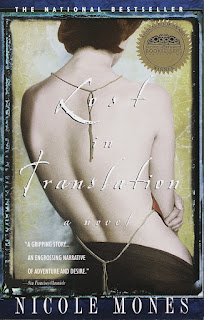Throw Back Thursday
This review of Lost in Translation by Nicole Mones was first posted on April 2, 2008.
Mones is the author of several novels set in China, most recently Night in Shanghai, about African-American jazz musicians leading Shanghai's pre-WWII jazz scene.

No, not the Scarlett Johansson movie. This Lost in Translation is an imaginative and satisfying novel by Nicole Mones. The protagonist, Alice Mannegan, is an American living in China, working as an interpreter, and striving to be accepted in the culture she has adopted. When hired by a second-rate American anthropologist, the two hook up with his Chinese counterparts and head to Inner Mongolia looking for the lost remains of Peking Man.
Mones does a great job of weaving the histories of the characters into the main story. While the team follows the trail of homo erectus, Alice struggles to understand her relationship with her powerful father; her boss worries about losing his son’s affection and respect; and their Chinese cohort searches on the sly for the wife he cannot abandon although she disappeared to a work camp during the Cultural Revolution. Mones uses the historic relationship between French priest Pierre Teilhard de Chardin and his platonic lover, Lucile Swan, to bring thematic unity to the varied storylines.
Equal parts historical mystery, foreign adventure, and cross-cultural romance, Lost in Translation has a lot to offer.
